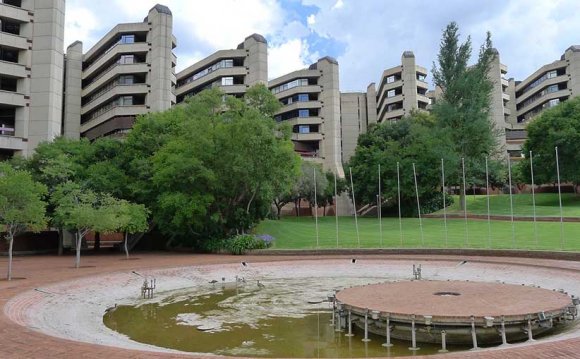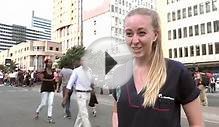
 Jul
Jul
25
2011
I am beyond excited to have Medical Education Monday back this week with Renate from “The Regatta” as our guest. Renate is a 20 year old South African medical student in her second year of medical education. She is interested in Pediatric Surgery, but makes sure to let me know that at this stage in her education she has a lot left to experience and is keeping an open mind. Renate speaks two languages fluently (English & Afrikaans), knows enough German to get around and is in the process of learning a couple more languages in order to better communicate with her future patients. How are ALL of my Med Ed Monday guest posters so talented? They never cease to amaze me. When she’s not suffocating underneath a pile of heavy, international edition medical textbooks or practicing a new language, she enjoys swimming, quilting and playing the flute. Thanks for stopping by to read about Medical School in South Africa, if you have questions, feel free to shoot me an email or contact Renate directly!
But first, vote in the poll from yesterday! Pretty please.
[polldaddy poll=5261349]Getting In:
How old is one when they begin medical school?
The majority of students study medicine straight out of high school or a couple of years after high school. Most people are around 18 years old when they begin medical school.
What exams does one have to take to get in?
The prospective med student must pass the National Senior Certificate (aka “Matric, ” “Grade 12, ” or “The Standard 10” if you happen to belong to an older generation) with university exemption.
Is there any required pre-requisite coursework?
You must have both Science and Maths as matric subjects.
Is it a competitive occupation?
Yes, getting into med school is really tough! You must be a top student (85-90% average for matric, preferably 90% or more). Community service can also help. All students applying for med school must fill in what they call a “Value Added Form” (this always made me feel like a taxable object) which covers all extra-mural activities, leadership positions, extra qualifications, etc. There are also all sorts of rumours regarding quota systems for student intake divided on the basis of ethnic groups. I have no idea whether these rumours have any factual basis or not, it’s simply another interesting part of living in South Africa!
What are you called at this stage of training?
One very stressed high school student!
Being In:
How long is it?
The MBChB degree takes 6 years.
How are the years broken down?
- The first six months of first year are devoted to basic sciences (chemistry, physics, biology) as well as a bit of philosophy, sociology, medical terminology.
- The second six months of first year and the entire second year the medical student painfully acquires knowledge in the area of the basic medical sciences like Physiology, Anatomy, Immunology, etc.
- Third and fourth year, as well as the first six months of fifth year, are devoted to more clinical knowledge.
- From fourth year onwards the student rotates through different sections of various hospitals for morning rotations. In the afternoons there are lectures and evenings are for studying.
- The second semester of fifth year and the entire sixth year is spent in the hospital as a student intern, once again rotating through hospitals and departments.
Note: This describes the medical program at my university. This is not necessarily applicable at all South African medical schools!
Describe your typical day.
I’m in second year right now, so my day is not particularly exciting! We usually have lectures from 8:00 until 13:00. Lunch break is from 13:00 until 14:00, followed by practicals or tests on some afternoons, depending on the schedule of my particular group. Usually we’re done by 16:00.
This does change periodically though, depending on what block we’re doing! For instance, during anatomy block we finished at 5 ‘o clock in the afternoon almost every single day, while in Block 1 (the very first block at med school) we would often finish at one ‘o clock and be home in time for lunch!
If you choose a specialty, when do you have to decide by?
I’m only second year, so I’m not totally sure. Our undergraduate degree is six years. However, before a doctor can practice in private practice or specialise, we have to complete 2 years of internship as well as 1 year of community service. (Also known unofficially as “Zuma years”, not so affectionately named after President Jacob Zuma, who may or may not have had a hand in prolonging this time period.) As far as I know, any time during the Zuma years is a good time to apply for a specialty position.
What are you called at this stage of training?
While completing the MBChB degree you are known as a med student or student intern (during the last year and a half.)
Getting Out:
What exams do you have to take?
Uhm…Finals? I don’t think we have a fancy name like USMLE…
Do most people graduate?
According to the upbeat and encouraging “welcome to med school” speech that we had to suffer through on the first day of med school, yes, most people do graduate. (I can’t remember all the statistics they bombarded us with!) Having said that, not all students finish the degree in six years.
When are you finally considered a “doctor?”
Once you have completed the six year MBChB degree, then you are a doctor. However, you cannot move into private practice or specialise until you have completed the “Zuma years.”
Do you have additional training or do you start working immediately?
Zuma years are paid work, although I’m told the pay is not very good.
What’s the average debt for attendance?
Lots! I’m not actually sure what the precise number is. Working on a very generalized average, it would cost about R20 000 ($2, 953.40 USD) per year of study, which would work out to about R120 000 ($17, 720.40 USD).
Is the job security good?
In South Africa, there are not enough doctors for the population, so you should always be able to get a job. It might be somewhere really rural though!
RELATED VIDEO












